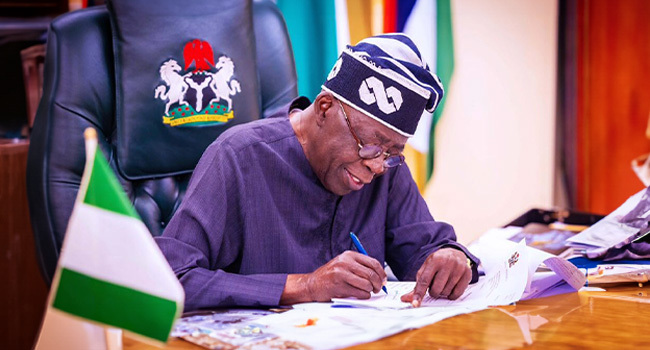What to know as Tinubu signs N70k minimum wage bill into law

March 31 tax filing Nigeria. President Bola Tinubu-led federal government unveils portal for national youth conference.
President Bola Tinubu has signed the minimum wage bill into law, raising the National Minimum Wage from ₦33,000 to ₦70,000. This action concludes months of discussions among government officials, labour unions, and the private sector.
The bill was signed on Monday at the State House in Abuja, shortly after the National Assembly passed the Minimum Wage Act, 2019. A delegation from the National Assembly, led by Senate President Godswill Akpabio and several House of Representatives members, were present.
Basheer Lado, Special Adviser to the President on Senate Matters, emphasized that this move fulfills a campaign promise. “President Tinubu’s signing of the minimum wage bill demonstrates his commitment to a people-centric governance model,” he stated.
Negotiation Background
The new wage law follows extensive negotiations with labour unions, who demanded an increase due to rising living costs caused by the removal of fuel subsidies and the floating of the naira.
Initially, labour unions proposed a minimum wage of ₦494,000, while the government offered ₦60,000.
After several rounds of negotiations, the workers demanded ₦250,000, while the government raised its offer to ₦62,000.
However, after prolonged discussions, a compromise of ₦70,000 was reached on July 18, as announced by Minister of Information Mohammed Idris.
READ ALSO
“He paid Emmanuella N20k monthly” — Denilson Igwe details split from Mark Angel
NLC, TUC begin nation-wide strike… here are key issues to know
Big Brother Naija season 9: Meet the “No Loose Guard” dynamic duos
Future Reviews
The ₦70,000 minimum wage will be reviewed every three years. Following the agreement, President Tinubu quickly sent the bill to the National Assembly, which passed it in one day.
Economic Context
This legislation comes as Nigeria faces significant economic challenges, with inflation reaching 34% in June 2024, according to the National Bureau of Statistics. President Tinubu, who took office in May last year, had promised a sustainable minimum wage, balancing the need for higher wages with economic realities.

